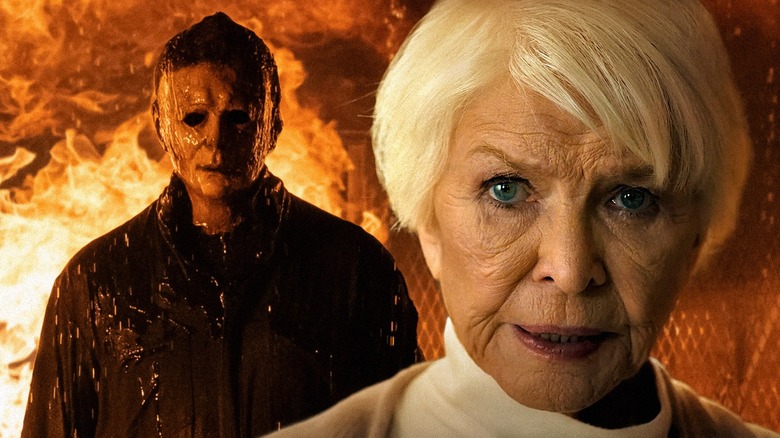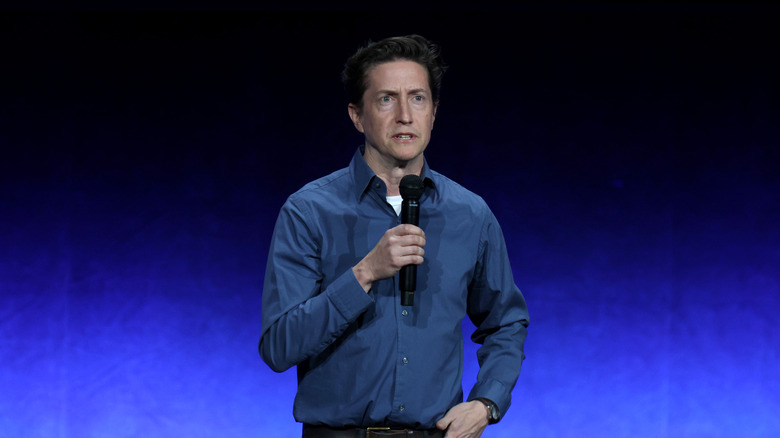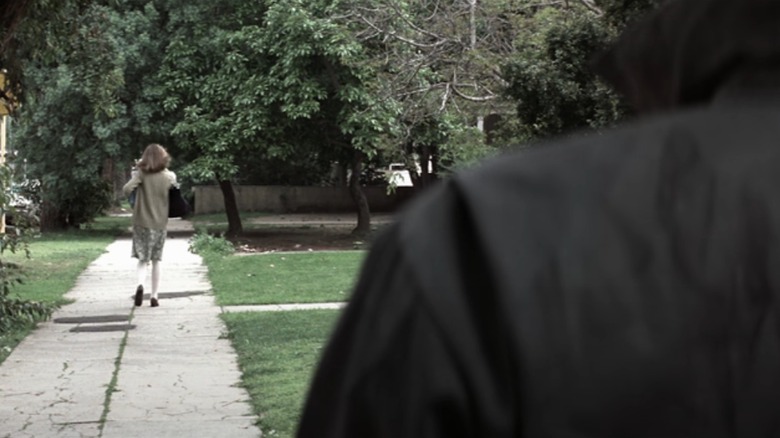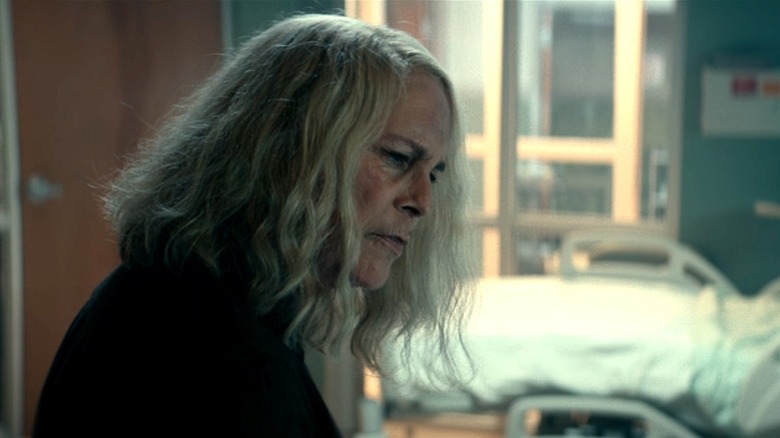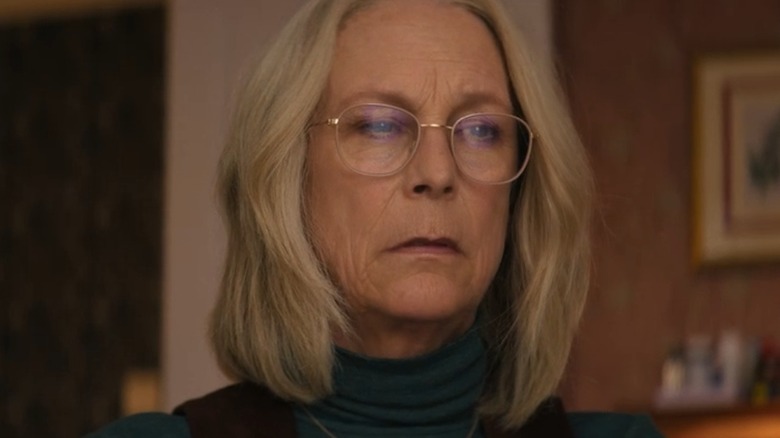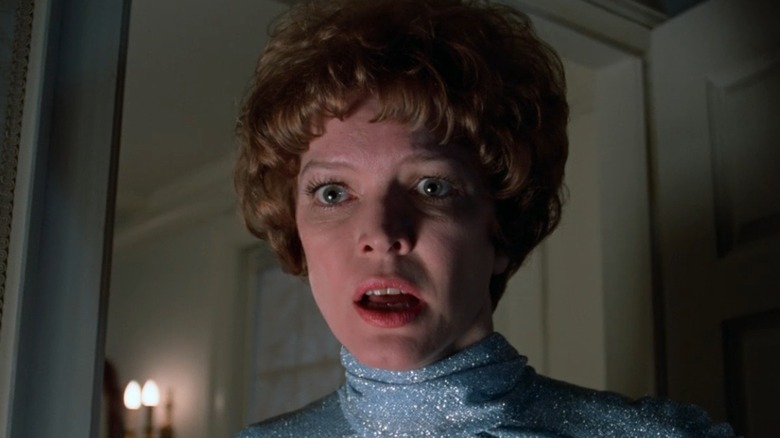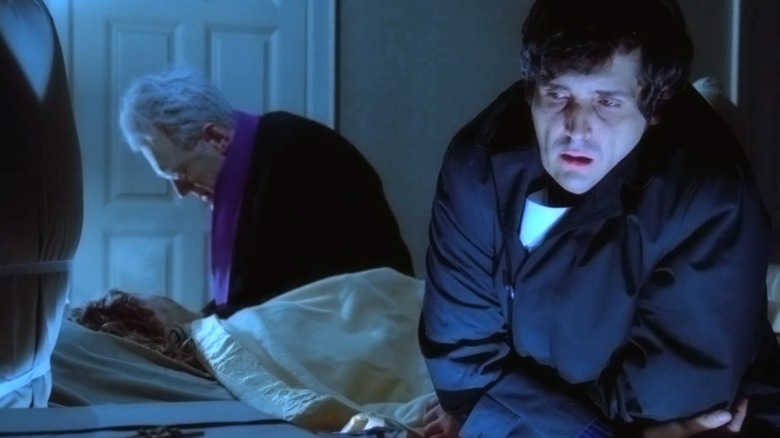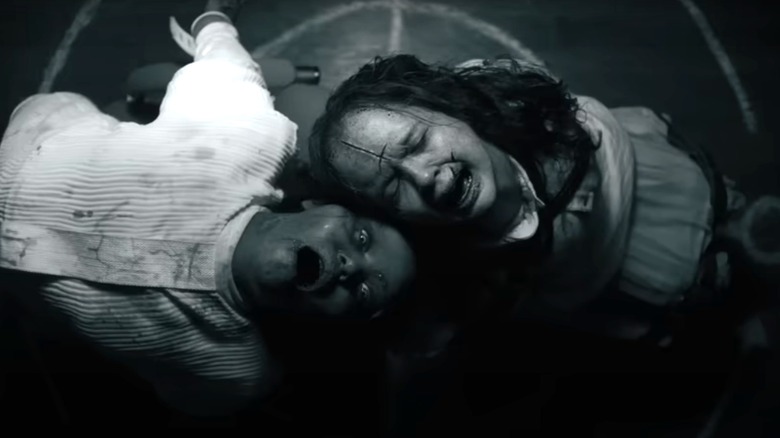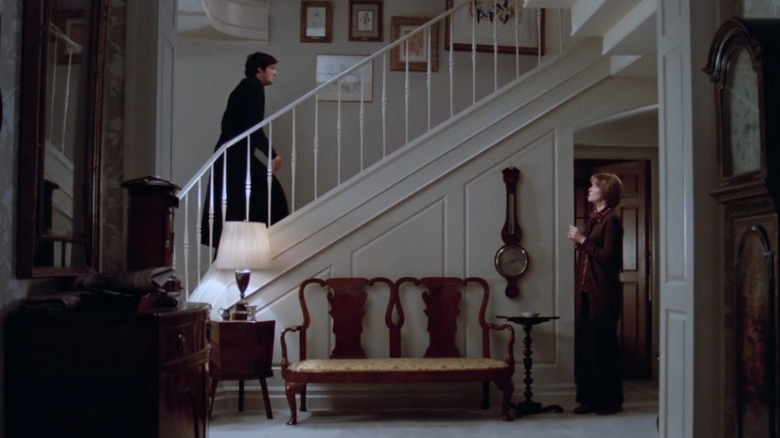Exorcist: Believer Faces The Same Mistake As David Gordon Green's Halloween Reboot
The "Halloween" franchise is bleeding out. And the "Exorcist" movies are about to be similarly wounded.
When reviewing David Gordon Green's recent "Halloween" trilogy, Roger Ebert's Brian Tallerico theorized that perhaps Green simply didn't grasp what made the original John Carpenter film special — and it's hard to deny this assessment. By the time filmgoers had reached 2022's "Halloween Ends," all of the most intriguing elements from Green's 2018 requel had deteriorated into a bloated, overwrought, incoherent mess. And yet, we know from Green's work on a range of critically acclaimed films (e.g., 2000's "George Washington," 2003's "All the Real Girls," and 2013's "Prince Avalanche") that he is an adept storyteller, with a firm grasp on the mechanics and importance of atmosphere, nuance, subtext, and symbolism.
So what happened with his "Halloween" movies? When these films are viewed collectively, in hindsight, a single explanation offers itself up: trust. Or rather, a lack thereof. Neither "Halloween Kills" nor "Halloween Ends" trust their audience ("Halloween" 2018 barely does), and the trilogy as a whole doesn't trust its genre — or even its own story.
None of this, then, bodes well for Green's "Exorcist" revival.
David Gordon Green doesn't trust Halloween or Exorcist viewers to understand his message
Good comedians don't explain their punchlines. Humor, like horror, relies on trust between the audience and the storyteller. We relate to the bit, fill-in the blanks, absorb the analogy or observation, and empathize, gleefully recoil, or otherwise place ourselves in relation to the storyteller and situation. The comedian can't do this for us. If they do, the humor is lost.
Sadly, this is exactly what David Gordon Green does over the course of his "Halloween" trilogy, and his reaction to its "backlash" (read: criticism) suggests he genuinely doesn't see his insufferable Storysplaining, or his repeated underestimation of the audience, as the problem it truly is.
In 2022, the director responded to his second chapter's poor reception by telling SFX Magazine (via Games Radar), "There's a lot of people that when they see an ending like that, or that kind of unresolved chaos, they get frustrated as a moviegoer," he said, adding "For me, that's just part of the fun." From there, he claimed audiences just wanted a shot-for-shot remake of the original. Later, when "Halloween Ends" earned the same criticism, Green told MovieMaker that, "For every bite of backlash, you also get people that are thanking you for taking it to a new place and keeping it alive."
Clearly, the director thinks what upset "Halloween" fans was that he took the story in a different direction. He's incorrect: the problem with "Halloween Kills" isn't a lack of resolution, an injection of chaos, or the fact that it wasn't the original. No one expects resolution in a Michael Myers movie, particularly when they know there's a follow-up, and audiences want new things. "New and different" isn't the problem here, and neither (for once) is the fandom.
David Gordon Green's Halloween loves to explain its metaphors
Like all great villains, Michael Myers has symbolic meaning. That he's the embodiment of fear itself is news to absolutely no one, least of all horror fans. In-world, however, he does not — and should not — be positioned as a metaphor for anything, since he is a literal monster who is literally picking off innocent people, one-by-one, in increasingly brutal and merciless ways. In horror, the "real thing" (be it an unstoppable murderer or demonic possession) happens to our proxies on-screen, and what it represents is embodied consciously or unconsciously in viewers.
That's how metaphors work. And since horror is all about metaphors, Green's attempt to control the narrative and leave nothing for the audience is both baffling and, frankly, a bit insulting. In "Halloween Kills," he wants the mob's takeaway to be "the real monster is fear" despite the fact that they're dealing with an actual monster — one who can't be killed or imprisoned, and who's going to keep killing until he's somehow stopped. In "Halloween Ends," he wants Laurie's (Jamie Lee Curtis) and Haddonfield's takeaway to be that evil — or our fear of it, since the film takes a sloppy stab at combining the attempted theses of parts 1 and 2 — is an infection, and that when it controls us, we also become monsters. But again, this doesn't work because in the "Halloween" universe, there is a literal monster (or two) who is literally killing lots of literal people.
There's nothing to respond or react to in this scenario because, as viewers, we're not given the chance to be both an active and passive participant. Unfortunately, it appears that Green doesn't trust us to be smart enough or reflective enough to play our part.
The Halloween trilogy is a turducken of commentary that feeds on itself
It's not that Green's trilogy is simply unsubtle. It's that his characters repeatedly arrive at our conclusions, and then articulate them at us with a didacticism that would make Ice T's Detective Tutuola blush. By the end of "Halloween Kills," one almost expects Laurie to turn to the camera and tell us what we're meant to take from what we've just seen.
Oh wait, that is what happens. Minus the camera bit.
While talking to Will Patton's Frank Hawkins — or rather, the viewer, since this is not how people talk — she says: "The more he kills, the more he transcends into something else impossible to defeat: Fear. People are afraid. That is the true curse of Michael. You can't defeat it with brute force. It is the essence of evil. The anger that divides us. It is the terror that grows stronger when we try to hide."
For starters, this trite little prose poem of a monologue doesn't actually make sense when it you break it down, and hold it up against the events of the films. If anything, it contradicts itself, particularly where its muddled commentary about mob mentality is concerned. Either Green doesn't think we'll notice this, or, he has such little faith in Michael as a metaphor — and in that metaphor's ability to relay its own commentary about the human condition while still being fun and scary — that he's willing to wrap it in another line of commentary, contradictions be damned. This is what happens when you don't trust your story or your audience: a movie that shouts at the viewer, ultimately saying nothing at all.
Tragically, no matter how well-received Green's "The Exorcist: Believer" is or isn't, odds are this is exactly what we can expect.
David Gordon Green is repeating his Halloween mistakes with The Exorcist
So, why would David Gordon Green repeat the same storytelling mistakes of "Halloween" in "The Exorcist: Believer," then? It's all about the "why." Specifically, why is that Green, a proven storyteller who never distrusted the audience in his past work, came out with one decent film followed by two cluttered, falsely profound, gory follow-ups?
Because Green doesn't trust his source material's past — that is, his own 2018 "Halloween" — because he shouldn't. And because he is a good storyteller, he knows this.
There was absolutely no reason (aside from dollar signs) to carry Michael Myers across three more films. Everything we had to learn from The Shape, we learned in "Halloween" (1978), a film so expertly composed that its entire story fit perfectly into 91 tension-filled minutes. The greatness of Carpenter's 1978 original is why everything that came after has been, at best, okay. In all the sequels, even the recurring theme of Laurie and Michael's influence on one another has never rung true. There's nothing pathological about defending oneself against a relentless assailant, or about responding to trauma in entirely understandable ways. Laurie isn't, and has never been (at least believably), the detective who loses herself in pursuit of the killer.
Still, we love Laurie, and we love Jamie Lee Curtis. That's what makes checking-in with her worthwhile, and it's why both "Halloween: H2O" and "Halloween" (2018) — which is just another swing at "H20" — exist. But that's the problem. Checking-in with a beloved character may be enough to justify one film, but definitely not three. Green knows this, and so, to force out two more films, he filled the void with equally forced messages that never belonged in "Halloween" in the first place.
The Exorcist doesn't demand a continuation, but Green will force it to have one
Unfortunately, this is the exact same position the director will find himself in post-"The Exorcist: Believer."
There's only one good sequel to William Friedkin's " The Exorcist" — William Peter Blatty's own "The Exorcist III" — and it's good because it gives us one of the only things we're still craving at the end of the original film: an answer to whether or not Father Damien Karras (Jason Miller) accomplished anything with his sacrifice. Ellen Burstyn's return as Chris MacNeil in Green's film is, in that same vein, the only reason for a new sequel.
Is it a good reason? Not really. As phenomenal as Burstyn's Oscar-nominated performance is in the original, the narrative itself benefits from the abruptness with which we leave her thread behind. Chris and her daughter (Linda Blair) were never the demon's ultimate prey. The fact that Karras' self-sacrifice for a child he's never actually met allows them to return to their lives is the point. "The Exorcist: Believer" will show us how Chris has dealt with her trauma over the years in the same way "Halloween" (2018) explored Laurie, but from a narrative standpoint, there's simply no compelling reason to resurrect a story that's already fully realized.
This lack of impetus proved problematic enough in the fairly straightforward story of "Halloween," resulting in two further sequels that tied themselves in knots trying to justify their existence, prompting Green to repeatedly explain their value to his audience. Unsurprisingly, it backfired. All the extra commentary wouldn't be enough to make "Halloween Kills" and "Halloween Ends" worthy additions to a narrative that needed none. And with a more complex, ambiguous film like Friedkin's, this lack of necessity could prove even more disastrous.
The original Exorcist is the antithesis of Green's Halloween trilogy
William Friedkin's approach to "The Exorcist" was entirely different. In "Leap of Faith: William Friedkin on the Exorcist," he explained, "I never thought about imposing metaphor or meaning." Speaking specifically about his Oscar-winning use of sound, he added, "I don't like to cue the audience on how they're supposed to feel. I like them to find that out for themselves."
The director's light touch is an enormous part of what makes "The Exorcist" tick. Most directly, he stated in the same documentary, "I asked the Exorcist audience to believe in what they were seeing."
This is what all great horror does, and it goes way beyond simply "showing, not telling." This particular approach doesn't just hope that the viewer will bring their own fears and perspectives to the narrative. It relies on the viewer doing so, because if they don't, the film's ambiguity becomes a frustrating distraction. Friedkin believed so wholeheartedly in his audience that he was able to explore faith, sacrifice, and love without providing a single answer for his many questions. His film embraces and runs on this, and as a result, every person who watches "The Exorcist" internalizes a slightly different story, a slightly different meditation on the nature of its central mysteries. This is why, half a century after its release, viewers are still talking about it, praising it, and analyzing it.
Ideally, Green's reboot would have the same faith in us that Friedkin did. Alas, based on "Halloween Explains," it's clear that this won't be the case with his "Exorcist" movies.
The new Exorcist movies are going down the wrong path
Green explained his approach to the "Exorcist" reboot to SFX Magazine (per Games Radar), stating, "You don't want to make something that's so heavy and academic that people aren't interested in going to see it." He added, "You have to disguise it, in a way. This is a movie that's about different types of faith, not just Catholicism."
Cool. You know what else isn't just about Catholicism? Yeah, you guessed it: the possessing demon of "The Exorcist" isn't Satan, but the Mesopotamian Pazuzu. "[The] personification of the southwest wind," as William Peter Blatty writes in the novel, "[whose] dominion was sickness and disease."
As Green knows, there's both a clash of "faiths" in the most dogmatic sense (faith meaning worship) and a recurrent theme of an internal crisis of faith wherein faith simply means "belief." Even Father Karras' crisis isn't just in Catholicism, but in his identity as a good literal son and a son of God, and in his newer-found "faith" in science and psychology — a crisis that overlaps with Chris' own loss of faith in science and medicine, and her identity as a mother. Ultimately, the most unnerving aspect of "The Exorcist" is its exploration of the relationship between belief and agency — faith and fate. Possession films scare us because they tap into one of our deepest fears: that we might suddenly and irreversibly lose our personal autonomy. That the same faith (be it in science, religion, or social media) which gives us the illusion of control makes us even more vulnerable to a loss of control.
Choosing to make "Believer" about faith in general, and various systems of beliefs, is no great revelation. It's just Green spelling out the punch line again.
David Gordon Green isn't a believer in horror audiences
That Green's inclusion of other "types of faith" is offered up as a fresh twist demonstrates that, once again, he's misunderstanding the original work that inspired him. Moreover, since he's hitting us over the head with a title like "Exorcist: Believer," it's a near-foregone conclusion that the film would repeatedly explain to us that the word "believer" can mean many different things.
What's far more telling of things to come, though, is the director's implication about his audience. It's unclear what Green means by "heavy and academic," but the assumption that viewers wouldn't watch such a film or that he needs to "disguise" meaning in something easier to digest illustrates that, once again, the director doesn't trust horror audiences. All storytelling is disguising meaning in something else, but Green's supposition about his audience's capacity and tastes — and the fact that, in his "Halloween" films, he doesn't even try to disguise things, he just openly and repeatedly states his point — suggests that with his new trilogy, we're in for another round of meandering Ted Talks in the form of "horror movies."
No matter how good or bad "The Exorcist: Believer" may be, it was always destined to pale in comparison to the original, of course, partly because much of the original's power comes from its relationship to the society in which it was produced. But the true failure of "Believer" will be that instead of providing a semi-warranted bit of resolution to a poignant story, the film will springboard two more installments that don't need to be made — not now, not ever, and certainly not by a director who has turned his own crisis of artistic faith on an audience in whom he refuses to believe.
